Les Moulins Mahjoub—a Tunisian company committed to family, farm, history, organic, uncompromising taste and the revival of Berber tradition and cuisine. And, their New Harvest Olive Oil is here!
 This winter, the Rogers Collection crew travelled to Tunisia to visit the Les Moulins Mahjoub farm. The journey led them to a family and community filled with kinship and integrity, to a flute player playing traditional desert Berber songs that echoed off the walls of the ancient olive oil mill of the Temple of Jupiter, to the vibrant green olive oil itself. And it was all captured on video. Click on the video below to see the magic with your own eyes!
This winter, the Rogers Collection crew travelled to Tunisia to visit the Les Moulins Mahjoub farm. The journey led them to a family and community filled with kinship and integrity, to a flute player playing traditional desert Berber songs that echoed off the walls of the ancient olive oil mill of the Temple of Jupiter, to the vibrant green olive oil itself. And it was all captured on video. Click on the video below to see the magic with your own eyes!
Located in lush and verdant Tebourba, Tunisia in Northern Africa–bordering both the Mediterranean Sea and the Sahara Desert–the Mahjoub family farm has been holistically farming and producing Tunisian food in the traditional ways of the region for three generations.

Today, Mahjoub brothers Majid, Abdelwaheb, and Raouf, along with their seven sisters and three of their nephews, farm, produce and cook Tunisian food that honors the rich history of their family and of the land.
In the 15th century, the Mahjoubs’ ancestors were chased out of Andalusia and settled on the lands of the Berber tribe who were noted for their expertise in fruit tree cultivation. The Berbers and the Mahjoubs’ Andalusian ancestors integrated their agricultural and engineering skills to create flourishing farms in and around Tebourba.
To this day, the Mahjoub family holds onto a deep passion for farming and preparing foods in the traditional ways of the land that honor and support history, community and family.
So, what are these traditional ways of the land? Well, first we must know a little bit more about the fascinating Berber people.
 Although they settled in Tebourba, the Berber people were an ancient nomadic tribe. Yes, Tebourba is lush and beautiful, but it also sits exposed to the sea and the desert, vulnerable to attacks from other tribes. The Berber tribe had to stay on the move, heading to the protective mountains, to avoid attacks. Keeping light, small quantities allowed for swift travel. Sun-drying both reduced volume and concentrated flavor so a little food item went a long way, and the small, lightweight provisions could be easily hidden. So the sun-dried M’hamsa couscous, peppers, tomatoes, figs and apricots were bursting with flavor, yes, but also born from necessity.
Although they settled in Tebourba, the Berber people were an ancient nomadic tribe. Yes, Tebourba is lush and beautiful, but it also sits exposed to the sea and the desert, vulnerable to attacks from other tribes. The Berber tribe had to stay on the move, heading to the protective mountains, to avoid attacks. Keeping light, small quantities allowed for swift travel. Sun-drying both reduced volume and concentrated flavor so a little food item went a long way, and the small, lightweight provisions could be easily hidden. So the sun-dried M’hamsa couscous, peppers, tomatoes, figs and apricots were bursting with flavor, yes, but also born from necessity.
So, the Berber tradition–rooted in the sun–speaks to the holistic blend of family, love, community, roots based in survival and this concept of “food as history.” The food reflects both the beauty and the hardship of the land and the people.
Majid, who is involved in the promotion and marketing of the farm and its products, described this concept eloquently:
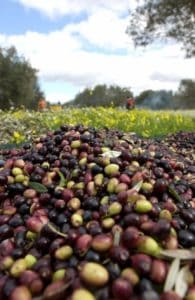
“To spread the harissa on the bread, and to eat it, and to love, and to cry in the same moment. They are looking more for the quality than the quantity…We try to preserve all of this–this history, this way of life of these people. This is the taste. The taste is all of this.”
But how to get this Berber cuisine–steeped in a history of nomadism, community, suffering, beauty, the sun, necessity–into the hands of people around the world?
Majid now works toward the rehabilitation of Berber cuisine and history while integrating contemporary elements of technology, culinary art, standards and taste. He strives to honor the story of the Berber tradition while making the food and the experience accessible and receivable to the chefs and food-lovers of the world.
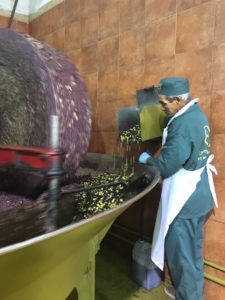
How can the Tunisian region, as Majid says, “contribute to the universal?” Many regions and countries around the world are known for a particular food item–like Italy is known for pasta. With Tunisia, Majid says, at the “core of the temple, the core of their prayer…we find olive oil.”
Oh, yes, the olive oil! Les Moulins Mahjoub offers many stellar products including harissa, sundried M’hamsa couscous, preserved lemons, chutneys and jams (visit our catalogue for a full offering) but let us talk about the olive oil for a moment!
Les Moulins Mahjoub uses hand-methods for their olive oil production dating back to Carthaginian times. The Chetoui olives are harvested just as they turn from green to black and then crushed in the family’s ancient stone mill in a genuine first cold pressing. Then the olive paste is layered in a vertical press between round natural fiber mats, or scourtins. Next, the oil is decanted by hand, or a la feuille, rather than by suction or draining.

But before the production comes the growing, of course! The detritus from the production of the oil goes back to the groves in a lovely closed-loop system. The “olive water” left over from the decanting process now irrigates the olive trees while the olive pulp is used for compost. For further soil enrichment, nitrogen-rich fava plants are grown and tilled into the soil of the groves. No commercial fertilizer needed! The Les Moulins Mahjoub family reaches toward a self-sustainable and organic farm that does not rely on petroleum and outside resource, but rather toward a farm that adheres to the principles of community and tradition.
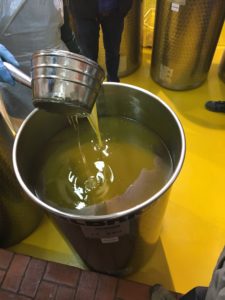
After growing, comes harvest!
Many other olive regions such as Spain have a hot and humid, and short, harvest season. Tunisia benefits from the dry, cool climate coming in from the arid desert and the Mediterranean Sea which allows for a bigger harvest widow. And nearly the entire town is employed during harvest season! The older women of the town climb into the trees while the younger women do the more strenuous work of scooping up the olives once they have fallen to the fabric laid out at the base of the tree. Often the women sing traditional songs. The men transport the olives to the production facility.
Yes, the tangible result is a delicious, apple-green, vegetal, unfiltered, soft clean olive oil–but more than just the olives go into the bottle.
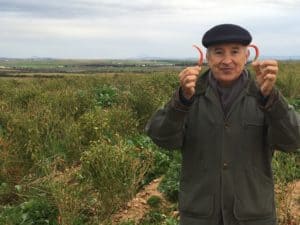
It is the heart and soul of a community that has lived on that land for centuries. In each bottle–as with all of Les Moulins Mahjoub products–is a history of family, Berber culture, quality and tradition.
Majid says, “As the poet makes with words, the poem, it [the food] belongs to the soul of the person who is making the taste.”
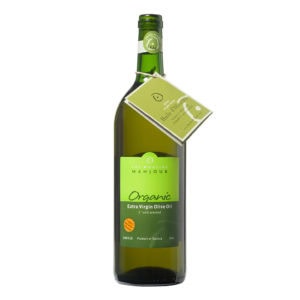
Read more about Les Moulins Mahjoub
Check out Les Moulins Mahjoub Organic Extra Virgin Olive Oil.
Visit this link to watch what we discovered in Tunisia!
Want to try your hand at Tunisian cuisine? Look here for recipes!
Written by Leska Tomash